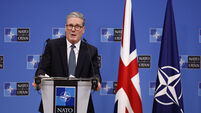UK delays border checks on EU food imports

The UK's chief Brexit negotiator David Frost said firms need to focus on Covid recovery before dealing with more Brexit red tape. File picture
The UK has delayed the introduction of new post-Brexit border checks on food from the EU, as British retailers battle a supply chain crisis fuelled by the pandemic and the effects of quitting the EU.
Physical inspections of EU food imports due to start in January 2022 will now happen in July 2022, Brexit minister David Frost said in a statement.
A requirement to pre-notify border staff of arriving food products has also been delayed, he said.
“We want businesses to focus on their recovery from the pandemic rather than have to deal with new requirements at the border,” Mr Frost said.
“Businesses will now have more time to prepare for these controls,” he added.
Introducing the new import checks was expected to add extra pressure to supply lines at a time when supermarkets are already struggling with shortages.
The EU is Britain’s largest trading partner and about 30% of all food consumed in Britain comes from the bloc, according to the British Retail Consortium.
From October, food products from the EU were also due to require extra paperwork to enter the UK. That requirement will now come into force in July 2022, Mr Frost said. But goods being imported from the EU will still have to be accompanied by customs declarations, a new paperwork requirement coming into force on January 1, 2022.
The UK logistics industry had warned of a shortfall of veterinary professionals in the EU to provide the necessary documentation for food, and also about a lack of readiness of infrastructure at Britain’s ports to handle the new customs checks.
Mr Frost said the British government is on track to create the necessary infrastructure to handle the new checks.
Last week, the head of the UK’s Food and Drink Federation, Ian Wright, said the country faces “permanent shortages” of popular food and drink items due to a labour shortfall.
A lack of workers in the food supply chain, in part caused by Brexit and the coronavirus pandemic, means Britons can no longer expect to find whatever they want on supermarket shelves or in restaurants, Mr Wright said.
“That’s over, and I don’t think it’s coming back. It’s going to get worse, and it’s not going to get better after getting worse any time soon," he said.
Gaps in the UK labour market have roiled supply chains, with shortages of HGV drivers, slaughtermen and engineers disrupting the flow of goods. The food industry is short of about 500,000 employees, or one-eighth of the required workforce, and part of this is due to EU nationals returning home after Brexit, Mr Wright said.
• Bloomberg













